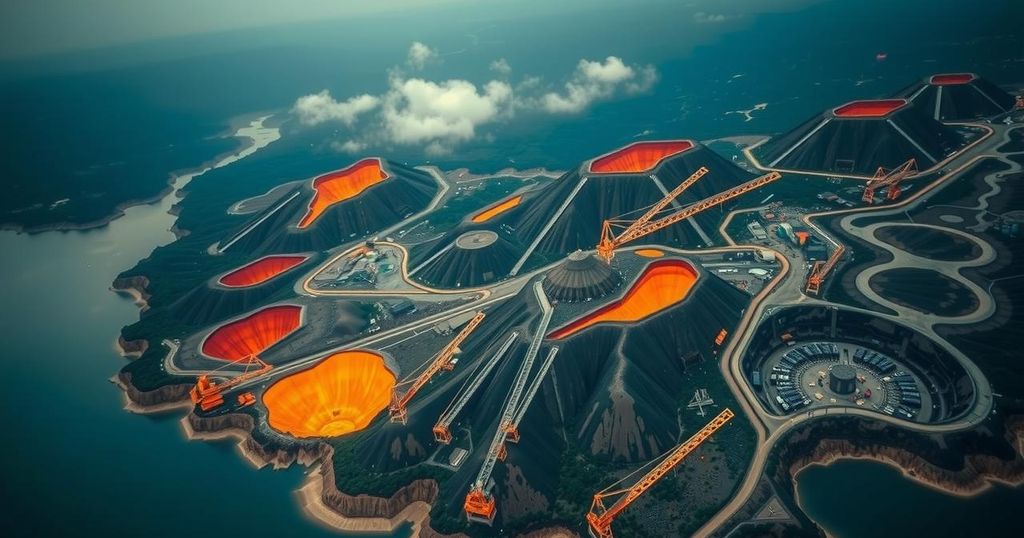Challenges of Illegal Gold Mining in Eastern DR Congo
The eastern Democratic Republic of Congo faces challenges due to illegal gold mining, primarily executed by Chinese companies without proper permits. Local advocates, including priest Davide Marcheselli, highlight the environmental damage caused by these operations. Recent government suspensions of illegal mining have led to a surge of companies seeking permits, while artisanal miners continue to struggle against better-resourced foreign enterprises. The government’s attempt to regulate the gold export market has yielded limited success as issues of transparency and accountability persist.
Italian priest Davide Marcheselli has been a vocal opponent of the illegal gold mining operations conducted by Chinese companies in Kitutu, located in eastern Democratic Republic of Congo. He asserts that the mining activities have deleteriously impacted the local environment, contaminating rivers and decimating agricultural land. In South Kivu province, a multitude of foreign firms, predominantly Chinese, operate gold mining ventures, frequently flouting local regulations and failing to report profits, as outlined by local authorities. For years, civil society organizations and church members in Kitutu have been the primary advocates challenging the entrenched interests of mining companies, who are often supported by influential figures. “From the deputies to the village chief, everyone receives something from the companies, money or shares,” Marcheselli disclosed. In a significant move, South Kivu’s governor, Jean-Jacques Purusi, recently suspended all “illegal” mining operations until stricter compliance with Congolese law could be ensured. This includes the renewal of mining permits which have, in some cases, been expired for decades. Following the suspension, there was an unprecedented influx of mining companies seeking authorization to operate legally, with Governor Purusi remarking, “In place of the 117 illegal companies we invited, 540 showed up here overnight.” Despite the legal challenges posed to larger firms, artisanal mining continues strongly in nearby Kamituga. Many local miners rely on primitive methods, earning meager sums compared to the resources wielded by Chinese companies, which often bypass regulations through local partnerships. The Congolese mining code prohibits foreign involvement in artisanal mining, yet these Chinese firms utilize local cooperatives as fronts to evade the restrictions. Approximately half of the cooperatives in the region are reported to be aligned with Chinese entities. However, access to these mining sites is heavily secured, complicating oversight and regulatory efforts. Local inspectors highlight the challenge of effectively monitoring operations, as they are often denied entry. “It is difficult to monitor these companies,” stated inspector Ghislain Chivundu Mutalemba. Gold extracted in Kamituga is typically distributed by local traders to Bukavu, the provincial capital, where sales channels are frequently obscured. A significant portion of transactions occurs via the black market. In December 2022, the Congolese government attempted to regulate gold exports more tightly by awarding a monopoly to state-run Primera Gold, aiming to disrupt illegal routes. However, reports indicate that the effectiveness of these new regulations has been limited, as Primera Gold struggles with liquidity issues, ultimately failing to curb illegal sales. Both the government and NGOs remain in the dark regarding the operations of Chinese mining companies, which continue to operate with relative impunity. Even Governor Purusi demurred at the lack of transparency, noting, “Their representatives put you through to a general telephone line or a minister in Kinshasa on the phone, to tell you not to bother them.”
This article examines the detrimental impact of illegal gold mining operations in eastern Democratic Republic of Congo, particularly focusing on the role of Chinese companies in the region. The ongoing conflict between local communities, civil society, and powerful mining firms highlighted the regulatory challenges faced by the Congolese government in managing its rich mineral resources. The influx of unauthorized mining companies has led to environmental degradation and economic exploitation, necessitating a critical look at international partnerships in the mining sector and the complexities of enforcing compliance with local law.
In conclusion, the situation in eastern Democratic Republic of Congo exemplifies the challenges faced by local communities in combating illegal mining activities, particularly those perpetrated by foreign firms. Despite efforts by local authorities to impose regulatory frameworks, the presence of powerful foreign mining interests undermines these initiatives. Ongoing advocacy by local leaders and civil society remains vital in the quest for accountability and environmental preservation.
Original Source: www.rfi.fr




Post Comment